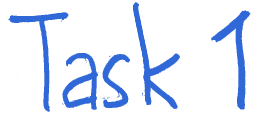Wow, this was hard work until now! Well done and hold on – finishing this unit, you will have developed your school’s own digitisation strategy plan! What we do now is to define concrete strategies from your ideas and document them.
We prepared a few last questions to answer. They will help you to structure and develop your ideas towards a future-oriented digitisation strategy.
Take the visualisation of the selected strategic options. This working step needs a lot of idea generation and discussions. Answer the leading questions within this phase piece-by-piece. This will help you to focus on the discussion’s scope and to work according to the timeframe.
| Elaboration of strategy plan | 120 minutes |
And here come the questions (remember: answer one at a time!). Do not forget do write down your answers. Later, you can simply transfer them into the tabular, which you find on the next page.
![]() Which is the fundamental direction of development of our organisation?
Which is the fundamental direction of development of our organisation?
![]()
We do not only try to realise legal requirements, but actively develop the whole organisation. This means cooperation and communication with all actors and investments in structure and new ideas.
![]() Where do we want to position our institution?
Where do we want to position our institution?
![]()
Local enterprises recognise us as a school, which is actively engaged in innovative teaching and learning as well as responsible use of digital media. We invest in the quality of infrastructure and networks.
![]() How do we handle our most important stakeholders?
How do we handle our most important stakeholders?
![]()
We present our ideas clearly and well developed. We take initiative to create new cooperation or to join existing communities.
![]() Where do we see the focus of our added value? (means: what do we provide our customers in comparison to others?)
Where do we see the focus of our added value? (means: what do we provide our customers in comparison to others?)
![]()
We develop and provide motivating learning environments, oriented in actual technical, social and economic requirements. Students learn not only for school, but also for their life.
![]() Where do we want to cooperate?
Where do we want to cooperate?
![]()
We know that we cannot do everything immediately. We deepen our cooperation concerning further education of our teachers (get knowledge and capacities into our school), other schools (gain experiences and best practices) and economy/enterprises (create projects, internships).
![]() How do we design cooperation with partner organisations?
How do we design cooperation with partner organisations?
![]()
Invitations to school events, direct requests, visiting partners, establish regular exchange, transparency of actions and spread of actual information about our school.
![]() Which excellent skills do we have?
Which excellent skills do we have?
![]()
We are open-minded and engaged teachers. We are excellent in quality development and flexible work with didactics. We have a strong STEM profile.
Develop your school’s new digital strategy plan!

| Short Version | We live an innovative and sustainable teaching and learning culture. We constantly improve our processes to provide modern education and actively connect with our social environment. We are committed to empowerment, social and digital responsibility. |
Developed Version
| Fundamental Direction of Development | Together with leadership, colleagues, students, parents and collaboration partners we develop and implement teaching and learning approaches to prepare all actors for digital challenges in the contexts of learning, work and life. We realise participation and are fully aware of our model function. We have to comply with curricula, goals of education policies and our own and students’ expectations. We have to act as a public institution, as well as an economic enterprise. We develop fundamental digital structures in our school. We successively enter new fields, when we reached basics in infrastructure and experience. |
| Program of Product Range
|
Our main offers focus high quality general education, enable students to gather experiences in external, digital work environments and give all actors the same chances to enhance their digital competences. |
| Stakeholders
|
Our main stakeholders are our students, our colleagues, leadership and administrative staff. Technicians will become much more important for us. Cooperation partners, especially those with relation to digital education, will also become more important. Last, but not least, we need a greater communication with parents. |
| Core Competences
|
To realise our overall strategy, we notably need active exchange with students and colleagues, continuous development of our colleagues’ competences and steady observation of social and technological developments. These competences give us the key to provide education that moves with the times. |
| Cooperation
|
Exchange of teachers in digital communities and between school and (local) enterprises become more important and we create it actively. A tight communication with our education ministry is also necessary. |
| Strategic Guidance 1
|
Our students participate in the planning of classes.
That means to involve students’ ideas and digital capacities in our teaching concepts. Together, we develop new didactical frameworks, which allow self-organised learning and exchange between students on a digital base. We implement these kind of courses within the next 3 years. |
| Strategic Guidance 2
|
We create innovative teaching and learning concepts according to demands of work and life.
This means concretely that we involve the working environment in our curricula. We double the number of economic cooperation partners in the next 5 years and, in the meantime, dedicate more teaching hours to vocational orientation in the field of digital media. |
| … | … |








